At T20 Summit, Pondering How to Follow Through on the SDGs Despite Fraying Faith in Multilateralism
2019.06.21
Representatives of leading think tanks from around the world gathered in Tokyo on May 26-27 for the Think20 (T20) Summit, where they presented and discussed their policy recommendations for the G20 leadership summit on June 28-29 in Osaka. The theme of the T20 Summit is “Seeking a Sustainable, Inclusive and Resilient Society.”
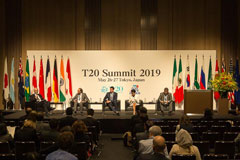
The leading think tanks from around the world convened in Tokyo to provide policy recommendations for this year's G20 Summit
Ten task forces developed policy recommendations ahead of the summit. Task Force 1, coordinated by JICA Research Institute (JICA-RI), is focused on the 2030 Agenda for Sustainable Development, also known as the Sustainable Development Goals, or SDGs. (JICA-RI also coordinates Task Force 5, which deals with “Cooperation with Africa.”)
The core idea of the SDGs is creating a world in which “no one is left behind,” an overarching goal that includes objectives such as ending poverty and hunger and mitigating climate change. It is, by definition, a project that requires multilateral and global coordination and action. However, Brexit and electoral trends around the world show a public loss of faith in globalism, multilateralism and organizations like the G20. This presents a challenge to the SDGs and similar initiatives, a thread that ran through many of the presentations at the T20 event.
In a keynote speech moderated by JICA-RI Director Izumi Ohno, who is also lead co-chair of T20 Task Force 1, diplomat Amina Mohamed, Kenyan cabinet secretary for Sports, Culture and Heritage focused on the WTO as an example of the importance of protecting multilateralism.
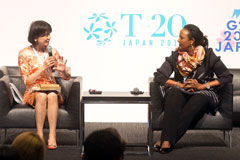
JICA-RI Director Izumi Ohno (left) and Kenyan Cabinet Secretary Amina Mohamed
“I highlight multilateralism and the rules-based global trading system because from the point of view of the developing world ... the progressive unraveling of multilateralism is damaging to developing country economies where trade holds the key to economic development, job creation, poverty reduction and therefore its most impactful engagement with the rest of the world,” she said.
Ohno made comments after the speech, saying that the strength of the G20, compared with the G7, lies in the diversity of stakeholders. Ohno asked Mohamed whether the G20 is inclusive enough, and Mohamed said it should welcome more countries from the South.
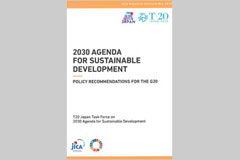
T20's Task Force 1 on the 2030 Agenda for Sustainable Development has developed 11 policy briefs
Task Force 1 covers, as part of the SDGs, the topics of universal health coverage, education, global institutional and financing issues, the role of the private sector and gender. The task force has produced 11 policy briefs. The two-day summit included the following six Task Force 1 panel discussions:
JICA President Shinichi Kitaoka gave a keynote speech on “UHC, SDGs, and Human Security,” followed by Gabriel Leung, the Univ. of Hong Kong, who outlined the overview of the T20 policy brief on UHC. These presentations sparked lively discussions among the panelists on what G20 and the international community can do to realize UHC in today’s world – including the continued commitment of international community, sustainable financing, government-led in-country partnerships, the health of migrants, migration of health professional, and effective utilization of innovation and technology for UHC.
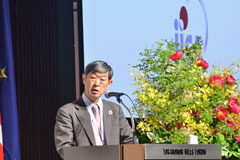
JICA President Shinichi Kitaoka gave a keynote speech
Policy Brief
・Deliberate Next Steps toward a New Globalism for Universal Health Coverage (UHC)
JICA Vice-President Nobuko Kayashima made opening remarks. Kazuhiro Yoshida, Hiroshima Univ., presented the recommendations to the G20, which emphasized requirements for inclusive and outcome-oriented quality education as well as responding to aspects of the current situation such as climate change and digitalization. Shinichi Tanaka, JICA senior advisor, elaborated on the recommended transformation of regular schools by prioritizing students’ learning instead of teachers’ teaching with shared responsibility among guardians and community, while highlighting the importance of non-cognitive skills. Other panelists spoke on the importance of early childhood development, elimination of gender gaps in education development, and teacher’s quality.
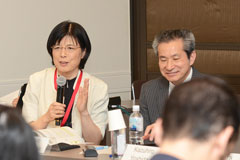
JICA Vice-President Nobuko Kayashima (left) and Kazuhiro Yoshida of Hiroshima University
Policy Brief
・Transforming Education towards Equitable Quality Education to Achieve the SDGs
Izumi Ohno, director of JICA-RI, presented key policy recommendations for scaling up the business impact on the SDGs, highlighting the need to embed the SDGs into core business strategies and operations, as well as promote “quality foreign direct investment (FDI)” to enhance developing countries’ global value chain (GVC) participation. Secondly, Kashuku Hirao, senior general manager at OMRON Sustainability Office, introduced OMRON corporation’s principles, which are based on the founder’s vision, and commitment to sustainability and explained how the company endeavors to incorporate sustainability into its medium-term business plan. Other panelists discussed conflicts between the current economic system and long-term SDG thinking and emphasized the need to create a sustainable ecosystem for all.
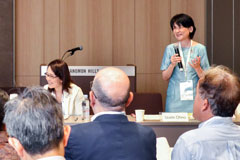
JICA-RI Director Izumi Ohno presented key policy recommendations for scaling up the business impact on the SDGs
Policy Brief
・Scaling Up Business Impact on the SDGs
Homi Kharas, the Brookings Institution, gave a keynote presentation on sustainable finance for development following the opening remarks of Hiroshi Watanabe, president of International Institute of Monetary Affairs. He highlighted the need to expand sustainable financing, improve allocation of development finance, and support developing countries in sector-specific platforms to generate coherent and quality project proposals linked to national development plans. Panelists, including Naoko Ishii, CEO of Global Environment Facility, gave comments on and discussed financial inclusion and how finance can support the achievement of the SDGs from an environmental point of view. This session was organized as a joint session of Task Forces 1 and 2 (International Financial Architecture for Stability and Development/Crypto-asset and Fintech).
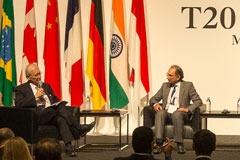
Hiroshi Watanabe of International Institute of Monetary Affairs (left) and Homi Kharas of the Brookings Institution
Policy Brief
・Sustainable Financing for Development
Sachin Chaturvedi, Research and Information System for Developing Countries, outlined key policy recommendations for enhancing science, technology and innovation (STI) cooperation and building technological and financial capability of developing countries. Active discussions followed among the panelists, including Tateo Arimoto, professor at the National Graduate Institute for Policy Studies, who introduced initiatives at multilateral fora including STI for SDGs Roadmaps, how Japan incorporates plans into multiple policies, ideas of “Technology Bank”, activities and challenges as well as the role of the G20 in supporting the initiative.
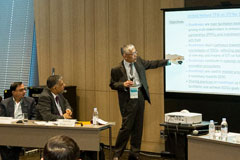
Sachin Chaturvedi of Research and Information System for Developing Countries (second from left) listens to Tateo Arimoto of the National Graduate Institute for Policy Studies
Policy Brief
・Leveraging Science, Technology and Innovation for Implementing the 2030 Agenda
Margo Thomas, founder and CEO of Women’s Economic Imperative, moderated this session. Jose Florito, CIPPEC, gave a summary of policy recommendations. Kanako Aramaki, manager of Women’s Active Participation Support Division, Kita-Kyushu City, introduced the city’s support on women’s labor participation (start-up and employment support), as well as its unique initiative for promoting executives’ and their subordinates’ work-life balances (“Iku Boss alliance”). Other panelists discussed imbalances in educational achievement, the importance of STEM education, monitoring systems for achieving 25 by 25 goals and so on.
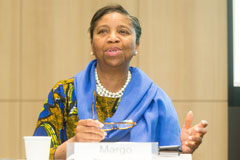
Margo Thomas of Women’s Economic Imperative moderated the session
Policy Brief
・Women’s Economic Empowerment: Strengthening Public and Private Sector Impact through Accountability and Measurement (SDG 5)
JICA-RI News Articles Related to the T20 Summit

事業事前評価表(地球規模課題対応国際科学技術協力(SATREPS)).国際協力機構 地球環境部 . 防災第一チーム. 1.案件名.国 名: フィリピン共和国.

事業事前評価表(地球規模課題対応国際科学技術協力(SATREPS)).国際協力機構 地球環境部 . 防災第一チーム. 1.案件名.国 名: フィリピン共和国.

事業事前評価表(地球規模課題対応国際科学技術協力(SATREPS)).国際協力機構 地球環境部 . 防災第一チーム. 1.案件名.国 名: フィリピン共和国.

事業事前評価表(地球規模課題対応国際科学技術協力(SATREPS)).国際協力機構 地球環境部 . 防災第一チーム. 1.案件名.国 名: フィリピン共和国.

事業事前評価表(地球規模課題対応国際科学技術協力(SATREPS)).国際協力機構 地球環境部 . 防災第一チーム. 1.案件名.国 名: フィリピン共和国.
scroll